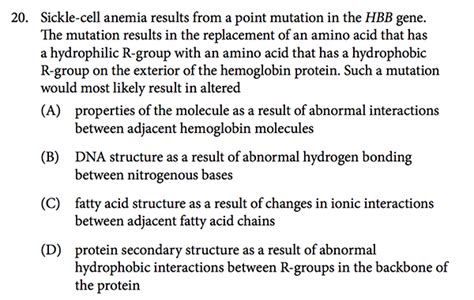Conquering the Advanced Placement (AP) Biology multiple choice section demands a comprehensive understanding of biological concepts and a strategic approach to answering questions. To help you excel on this crucial exam, we delve into the intricacies of the test format and provide you with time-tested strategies to crack each question type.

Test Format: A Comprehensive Overview
The AP Biology multiple choice section comprises 60 questions to be completed within 90 minutes. Each question carries one point, totaling 60% of your overall exam score.
Essential Strategies for Dominating Multiple Choice Questions
1. Read the Passage Thoroughly
Before selecting any answer choice, invest time in understanding the passage or scenario. Pay close attention to key terms, relationships, and experimental details.
2. Eliminate Obvious Incorrect Choices
Examine each answer choice critically. Identify options that are clearly contradicted by the passage or lack supporting evidence. Eliminate these choices to narrow down your options.
3. Use the Process of Elimination
If you cannot immediately identify the correct answer, use the process of elimination to rule out incorrect choices. Focus on the choices that best align with the passage and underlying concepts.
4. Consider Alternative Interpretations
Avoid assuming that the most straightforward interpretation is always correct. Consider alternative hypotheses or explanations that could fit the data or passage.
5. Trust Your Preparation
Confidently rely on your understanding of biological principles. If you have thoroughly prepared for the exam, you should be able to reason through the questions and select the best answer.
6. Time Management
Allocate time efficiently. Do not dwell on questions you cannot answer quickly. Move on and return to them later if time permits.
Effective Strategies for Specific Question Types
Experiment-Based Questions:
- Identify the independent and dependent variables.
- Understand the experimental design and controls.
- Draw inferences based on data analysis.
Data Analysis Questions:
- Interpret graphs, tables, and charts accurately.
- Identify trends, patterns, and relationships in the data.
- Apply statistical concepts to evaluate hypotheses.
Model-Based Questions:
- Analyze biological models and diagrams.
- Predict outcomes based on the model’s assumptions.
- Understand the limitations and strengths of the model.
Tables: A Visual Guide to Key Concepts
| Concept | Definition |
|---|---|
| Homeostasis | Maintaining a constant internal environment despite external changes |
| Cellular Respiration | Process that converts glucose into ATP |
| Photosynthesis | Process that converts light energy into chemical energy |
| Natural Selection | Mechanism by which organisms with advantageous traits survive and reproduce |
FAQs: Addressing Student Concerns
1. How many questions should I attempt?
Aim to answer as many questions as possible, but prioritize accuracy over quantity.
2. What if I run out of time?
Manage your time wisely. If you cannot answer a question quickly, move on and come back to it later.
3. How can I avoid careless mistakes?
Proofread your answers carefully. Eliminate errors by double-checking your choices and ensuring that you have considered all possible interpretations.
4. Should I guess on questions I am unsure of?
Educated guessing can be beneficial, but only if you have eliminated some incorrect choices. Do not guess randomly.
5. How can I improve my confidence on exam day?
Practice, practice, practice! Familiarize yourself with the test format and question types. Build a strong foundation in biological concepts.
6. How can I handle challenging questions?
Approach challenging questions strategically. Break them down into smaller parts, eliminate incorrect choices, and rely on your reasoning abilities.
Conclusion
Cracking the AP Biology multiple choice section requires a multifaceted approach. By understanding the test format, employing effective strategies, and mastering specific question types, you can significantly improve your performance on exam day. With consistent preparation and a positive mindset, you can conquer the multiple choice section and achieve your academic goals.
